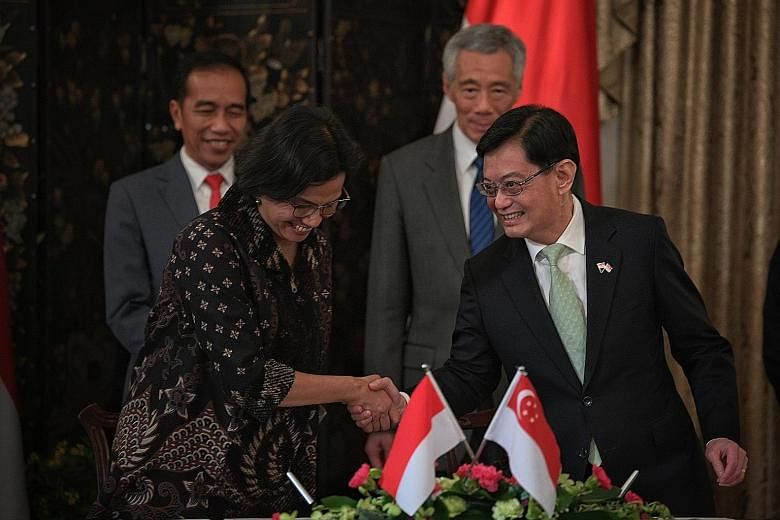Singapore and Indonesia will renew a US$10 billion (S$13.8 billion) currency pact, which will help support monetary and financial stability in the region.
Both countries will continue to have access to each other's currency as well as United States dollars to settle trades or defend their currency in times of financial stress.
This was announced by Prime Minister Lee Hsien Loong and Indonesian President Joko Widodo at the Istana yesterday as part of an annual Leaders' Retreat.
"A renewal on existing terms will help support monetary and financial stability in our countries and also in the region," PM Lee said at a joint news conference after a meeting between the leaders and an expanded meeting between their delegations.
The local currency swap and US dollar repurchase agreement, which was signed at the previous Leaders' Retreat in Bali last October, will be renewed for a year.
Through this deal, Bank Indonesia and the Monetary Authority of Singapore can obtain each other's currencies at the prevailing exchange rate, with the agreement to reverse the transaction at the same exchange rate on a specified maturity date.
Both central banks will also allow each other to obtain US dollars from each other in exchange for government securities, with the agreement to reverse the transaction on a specified maturity date.
Such an agreement will help reduce the uncertainty and risk that can stem from exchange rate fluctuations and provide liquidity to the banking system, or to support the domestic currency during periods of volatility.
At yesterday's retreat, both leaders affirmed the importance of the bilateral investment treaty, which offers protection for Singapore companies in Indonesia, as well as Indonesian companies in Singapore.
"We also agreed to encourage the speedy ratification of the bilateral investment treaty signed last year," said Mr Joko.
Singapore has ratified the pact, and it could go into effect once it is approved by the Indonesian Parliament.
More work will also be done to update the Avoidance of Double Taxation Agreement, which went into force in 1991.
"Both agreements would boost investor confidence and further increase two-way trade and in-vestment flows," Singapore's Mi-nistry of Foreign Affairs said in a statement.
Singapore has been Indonesia's top investor since 2014, with in-vestments reaching US$9.2 billion last year.
PM Lee and Mr Joko also welcomed the good progress that had been made on flagship bilateral investment projects.
PM Lee highlighted how the Kendal Industrial Park in Central Java "continues to thrive", and the Nongsa Digital Park in Batam has also done well.
The Kendal Industrial Park has attracted more than US$800 million in investments from almost 60 companies since it was opened at a previous Leaders' Retreat in 2016. And it is projected to create 7,000 jobs.
Separately, 90 international and local companies have set up shop at the Nongsa Digital Park, employing almost 800 Indonesia technology talents.
"Nongsa Digital Park is the digital bridge connecting the two countries, as defined by President Joko, and we are confident that under his second term, focus on digital economy will remain strong," said Nongsa Digital Park's senior executive director Marco Bardelli.
He hopes that the park will eventually become the "birthplace of Indonesia's next unicorns".
Unicorns are start-ups with a valuation over US$1 billion.
Collaboration in the digital economy will also be expanded through a pact signed by the two countries yesterday.
It involves an electronic exchange of trade data that will allow both Customs administrations to expedite clearance of trade and enhance supply chain security through better risk management, Singapore Customs said in a statement.
"Under this initiative, participating companies in Singapore and Indonesia may expect to benefit from a seamless and more efficient declaration process, and enjoy greater ease in doing business between Singapore and Indonesia," it added.
On the tourism front, PM Lee pointed out that cruise tourism cooperation is "cruising" on well.
Both countries have consistently been among each other's largest sources of tourist arrivals, with 1.8 million visitors from Singapore arriving in Indonesia last year and over three million visitors from Indonesia visiting Singapore.
Since both leaders' last visit to the Marina Bay Cruise Centre in 2017, new cruise routes from Singapore to Bintan, Surabaya and Bali have been launched.
More cruise infrastructure and destination development cooperation are on the cards, PM Lee said.
Both leaders also noted that there had been strong interest from Singapore to be involved in infrastructure projects in Indonesia.
Infrastructure Asia, a Singapore government agency, and Sarana Multi Infrastruktur, an Indonesian state-owned enterprise, have recently signed a deal to support public-private partnership project development in the country.
Singapore-Indonesia relations: Key areas of cooperation
At the Singapore-Indonesia Leaders' Retreat at the Istana yesterday, ministers from both countries took stock of the wide range of cooperation and discussed key areas they could do more on. Here are some highlights.
KENDAL INDUSTRIAL PARK
The Kendal Industrial Park (KIP) in Central Java has attracted 59 tenants and over US$800 million (S$1.1 billion) of investments since it was jointly opened by Prime Minister Lee Hsien Loong and President Joko Widodo at the 2016 Leaders' Retreat, and is projected to create almost 7,000 jobs. A new polytechnic was inaugurated this year to train the local workforce. KIP has also been designated a Special Economic Zone, enhancing its competitiveness and attractiveness to businesses and investors.
NONGSA DIGITAL PARK
Batam's Nongsa Digital Park serves as a "digital bridge" between Singapore and Indonesia, and has almost 800 Indonesian technology talents working for 90 local and international companies. There are plans to develop additional capacity for technology talent in the Nongsa park, such as the Eco Digital Project to create a new ecosystem to connect technology companies and talent.
HUMAN RESOURCE COOPERATION
President Joko Widodo is keen for both sides to continue deepening cooperation in human resources, and both leaders agreed on the need to grow and upskill human resources to meet the needs of industries and support expanding economic ties. Singapore has trained thousands of Indonesian officials and trainers under more than 20 bilateral memorandums of understanding. Companies like SMRT International and MRT Jakarta are also working together in capacity building and human resource development.
PEOPLE-TO-PEOPLE TIES
Officials have been tasked to organise a Singapore-Indonesia Civil Service Forum for civil servants from both sides to learn from each other's best practices. The leaders hope that improving excellence in public administration and implementation of bureaucratic reforms would catalyse further mutually beneficial cooperation across various sectors, and strengthen ties between officials on both sides.


